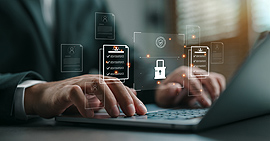How to protect yourself against malware
10/02/2022
Now you know about the different types of malware, this new post in the “Protect yourself against fraud”Abre en ventana nueva series tells you how to avoid them. Remember that malware is computer software that infects your device, aiming to stop it from working properly, render its systems useless and steal information. Here are some pointers on avoiding malware:
- Beware emails with an attached file (xls, doc, pdf, zip, exe) or containing a link. They can be an attempt at phishing.
- Pay attention to text messages containing strange links conveying a false sense of urgency, even if they appear alongside other legitimate messages.
- Be careful with the websites you browse, such as sites for downloading files that infringe copyright or "pirate" computer software, and avoid clicking on the links on those sites. Take the same precautions on social networks. Cybercriminals and malicious users also use them to infect other people’s devices with malware.
- Don’t use unknown devices such as USB sticks or hard drives. Don’t connect your USB sticks to public computers either.
- Regularly review the app permissions on your mobile phone and consider removing non-essential apps.
- Don’t trust unfamiliar short URLs. There are websites that reveal the original URLs.
- Install an antivirus and keep it up to date. It seems obvious, but “going commando” on the internet poses its risks.
- Only install apps from official app stores. Never install those from links sent by email or SMS.
- The device not working as smoothly as usual, it freezing often, hard drive space being eaten up or browser extensions appearing that you don’t remember installing are all indications that it might be infected.
But we don’t want to frighten you either. Is online banking safe? Yes, it’s very safe if you take some basic precautions. Just like driving on motorways is safe, provided your car is in good condition and it satisfies certain safety measures. Your bank also has complex and sophisticated security systems that don’t make cybercriminals’ life easy. For example, they need to comply with the Payment Card Industry Data Security Standard (PCI-DSS), among others, when they store, process and transfer cardholder or sensitive authentication data.
Make sure you bank securely. Remember that when cases of fraud occur, the courts assess user or bank negligence based on the circumstances of the specific case.



